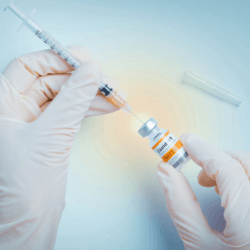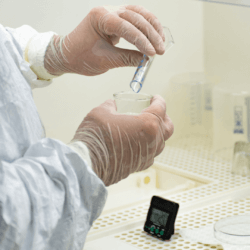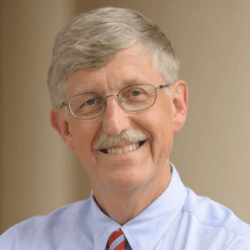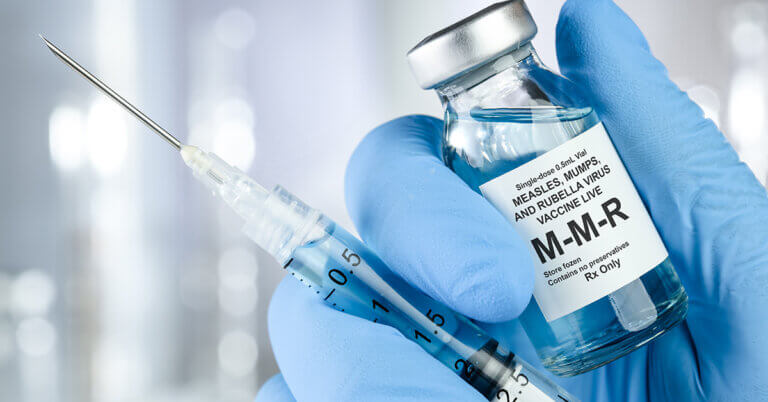August 24, 2021

Lee Hood On Fire: Leroy Hood, M.D., Ph.D. Interviews Dr. Francis Collins, Director of NIH

On June 18, 2021, Dr. Leroy Hood conducted a virtual interview with Dr. Francis Collins, Director of the National Institutes of Health, sponsored by the Precision Medicine World Conference. These two genetics pioneers explored the remarkable trajectory of biomedical breakthroughs over the course of their long careers, including how these breakthroughs have accelerated in recent years.
While their discussion was accessible to the general public, Lee and Francis pursued an interactive dialogue that encompassed the innovation and policy opportunities and challenges at the forefront of medical science. They devoted the first half the program to discussing COVID.

Lee began by asking Francis to detail the NIH’s most important contributions in the global quest to understand and address COVID-19. In his response, Francis focused on three areas: vaccine development, therapeutics and diagnostics.
Regarding vaccines, the NIH was instrumental in propelling the development of COVID vaccines in just eleven months, five times faster than had ever happened previously with an infectious disease. In January 2020, Moderna developed its prototype messenger-RNA vaccine within a few days of receiving the virus’ genetic coding. Phase 1 trials began just two months later.
Francis emphasized that the extraordinary development pace founded on 60+ years of scientific research regarding the nature and application of messenger-RNA therapies. In this way, science built “step by step” on the basic research of many people, most of whom were unaware of the profound impact messenger RNA could have on vaccine development. The challenge now is to use these new vaccines to inoculate the world.
On the therapeutics front, the NIH assembled 20+ partnerships with industry and government agencies to test therapies and design master protocols. This led to over twenty expedited clinical trials. Through this process Remdesivir, monoclonal antibodies, and more recently antiviral drugs emerged as effective therapies for treating COVID. Despite the progress, there’s still much that medicine doesn’t understand regarding COVID disease spread and manifestation.

On diagnostics, the NIH applied an open-source approach to developing and distributing COVID tests. From over 700 applications, 32 companies developed tests that are approved and used by the U.S. system millions of times a day.
Virus variants, vaccine hesitancy and longer-term COVID symptoms remain significant challenges for the scientific and medical communities. Both Lee and Francis believe COVID will be with us for some time. They wonder about the nature of immunity levels and duration (from vaccines and disease exposure) as well as the autoimmune characteristics of long COVID. Lee suggested that deep immuno-phenotyping at the single-cell level may be the key to understanding and treating long COVID patients.
Francis ended the COVID discussion by proactively advocating that the medical community develop vaccines through Phase 1 trials for the 20+ pathogens already topping the list of most likely to trigger a pandemic. This would cut vaccine development time at least in half and advance development of pathogen-specific therapies. This, of course, would require commitment and funding.
The interview’s latter half was more personal and wide-ranging. Highlights included the following.
- Francis’ decision to shift early in his career from chemistry, physics and quantum mechanics into biology and human genetics. He made this shift because he wanted “to study life.”
- Leading the team of 2,400 scientists in six countries that first mapped the human genome has been the pinnacle accomplishment of Francis’ career. They accomplished the work in the year 2003, ahead of time and under budget. Twenty years later, the study of genetics and genomics has matured and, collectively, shapes many aspects of medical inquiry.
- Moving medical practice away from “one-size-fits-all” prevention and embracing “real precision prevention.” With the sequencing of our individualized genomes, each of us would follow “the cues for the things we should pay attention to and other things we don’t have to pay that much attention to.” The NIH’s “All of Us” program, that is collecting biomedical data from a diverse cohort of a million individuals, will provide a remarkably robust data set to advance personalized medicine.
- Francis is bullish on continued bipartisan support for increased medical research at the NIH. Under his leadership, the NIH is exploring a nimble DARPA-like approach (ArpaH) to “invent the future” outside the constraints of the NIH bureaucracy. Francis also stresses the need to attract and nurture the next generation of leading scientists, who he believes will be both more diverse and more productive.
Those of us throughout the industry can learn a lot from conversations between visionaries like Francis Collins and Leroy Hood. They know how to think broadly, strategically, and very tactically, and their ideas can have a huge impact to revolutionizing the future of healthcare.
 Francis S. Collins, M.D., Ph.D. was appointed the 16th Director of the National Institutes of Health (NIH) by President Barack Obama and confirmed by the Senate. He was sworn in on August 17, 2009. In 2017, President Donald Trump asked Dr. Collins to continue to serve as the NIH Director. President Joe Biden did the same in 2021. Dr. Collins is the only Presidentially appointed NIH Director to serve more than one administration. In this role, Dr. Collins oversees the work of the largest supporter of biomedical research in the world, spanning the spectrum from basic to clinical research.
Francis S. Collins, M.D., Ph.D. was appointed the 16th Director of the National Institutes of Health (NIH) by President Barack Obama and confirmed by the Senate. He was sworn in on August 17, 2009. In 2017, President Donald Trump asked Dr. Collins to continue to serve as the NIH Director. President Joe Biden did the same in 2021. Dr. Collins is the only Presidentially appointed NIH Director to serve more than one administration. In this role, Dr. Collins oversees the work of the largest supporter of biomedical research in the world, spanning the spectrum from basic to clinical research.
Dr. Collins is a physician-geneticist noted for his landmark discoveries of disease genes and his leadership of the international Human Genome Project, which culminated in April 2003 with the completion of a finished sequence of the human DNA instruction book. He served as director of the National Human Genome Research Institute at NIH from 1993-2008.
Dr. Collins is an elected member of both the National Academy of Medicine and the National Academy of Sciences, was awarded the Presidential Medal of Freedom in November 2007, and received the National Medal of Science in 2009. In 2020, he was elected as a Foreign Member of the Royal Society (UK) and was also named the 50th winner of the Templeton Prize, which celebrates scientific and spiritual curiosity.
 Leroy Hood, MD, PhD, is a 4sight Health contributor, a member of the National Academies of Sciences, Engineering and Medicine, a professor and co-founder of the Institute for Systems Biology and senior vice president and chief science officer of the Providence St. Joseph Health system. Here are two of his recent articles that first published in the LA Times Second Opinion column and on the 4sight Health platform. This is Lee’s vision for 21st Century Medicine.
Leroy Hood, MD, PhD, is a 4sight Health contributor, a member of the National Academies of Sciences, Engineering and Medicine, a professor and co-founder of the Institute for Systems Biology and senior vice president and chief science officer of the Providence St. Joseph Health system. Here are two of his recent articles that first published in the LA Times Second Opinion column and on the 4sight Health platform. This is Lee’s vision for 21st Century Medicine.
Newspaper articles by Lee Hood
- How Science Education Can Stave Off Demagogues (Jan 2021, first in published in LA Times)
- The Science of Wellness (March 2021, originally published in LA Times)
- Long-Haul COVID: Real, Complex and Challenging (April 2021, first published in LA Times)
- Alzheimer’s Disease: My Personal Journey and Search for a Cure (June 2021, first published in LA Times)
Interviews
- Lee Hood On Fire: Paradigm-Busting 21st Century Medicine Commonwealth Club
- Lee Hood on Fire: Scientific Aging: The Genetic Basis for Longer, Healthier Lifespans, an Interview with David Sinclair





